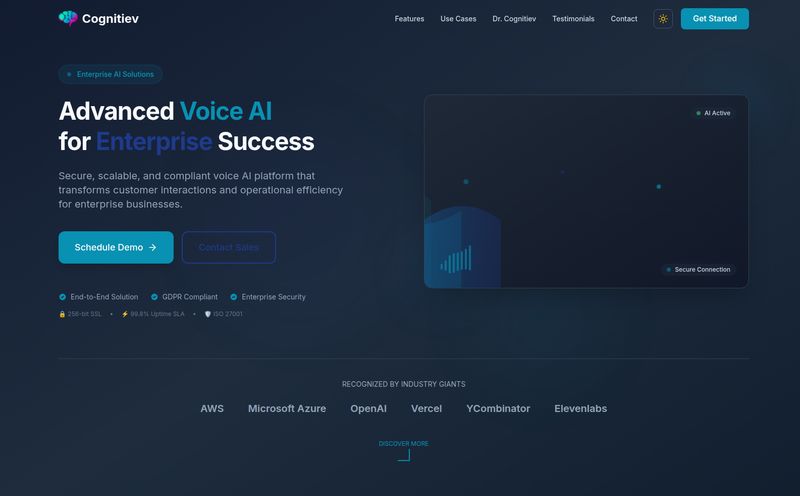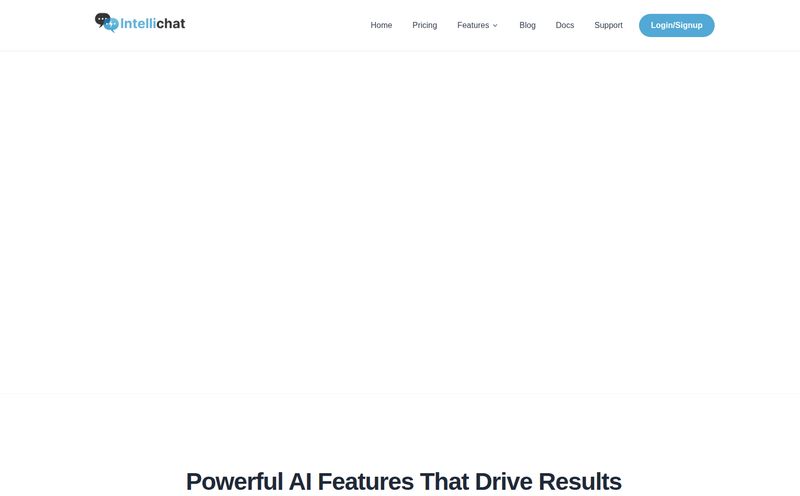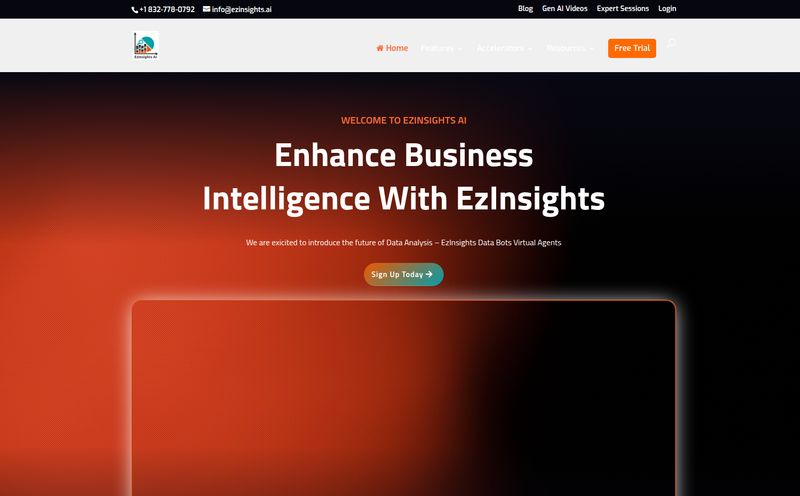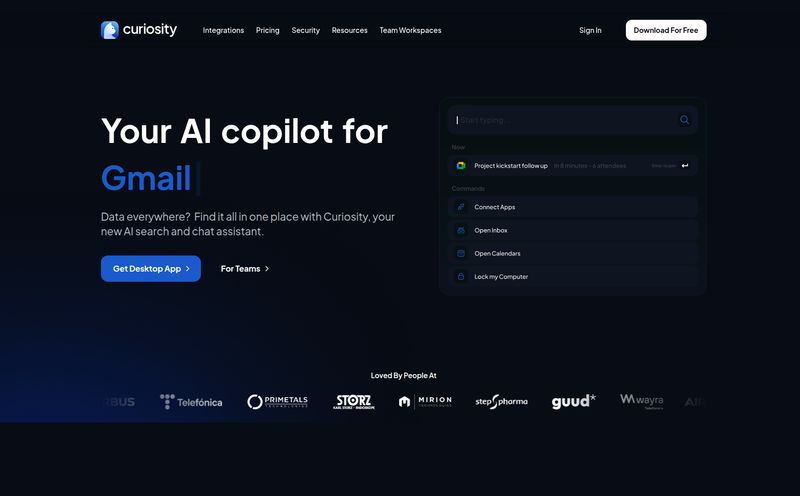We all have that one colleague. The one who navigates their computer like they're playing a piano concerto. Windows fly, cells populate, and designs shift, all without their hand ever touching the mouse. We watch in a mix of awe and shame, while we’re over here still doing the right-click, copy, right-click, paste dance. I’ve been in the SEO and digital marketing game for years, and while I know my way around a `VLOOKUP`, my muscle memory often defaults to the slower, mouse-driven path.
It’s a universal struggle. We know shortcuts would make us faster. We just... don't use them. The activation energy to learn and internalize them feels too high. But what if a tool could do the heavy lifting for you? That’s the promise of Reiden.ai, a self-proclaimed “Brilliant Keyboard Shortcut Copilot.” I’ve been hearing whispers about it, especially after it nabbed a 'Product of the Day' award, so I decided to take it for a spin. Is it just another piece of software that'll end up disabled at startup, or could this actually be the thing that saves my wrists and my sanity?
What Exactly is Reiden AI?
Think of Reiden less as a tool and more as a personal trainer for your fingers. It’s an AI-powered app that runs quietly in the background, observing how you work across your different applications. It doesn't just throw a giant, intimidating list of shortcuts at you. Instead, it watches for patterns. When it sees you repeatedly taking the “scenic route” with your mouse—like manually clicking 'File' then 'Save'—it gently pops up and says, “Hey, you know, you could just press `Ctrl+S`.”
It’s designed to be a subtle, real-time coach. The whole idea is to build better habits organically, by pointing out efficiencies at the exact moment you need them. It claims to integrate with over 20 popular applications, which is a pretty solid starting point for most of us knowledge workers who live inside a suite of different software all day.
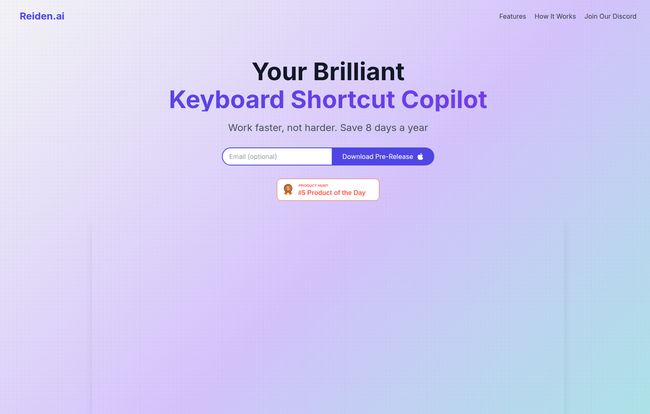
Visit Reiden
The Core Features That Actually Matter
A feature list is just a list. What I care about is how it feels to use the thing. Reiden’s approach is refreshingly focused on a few key areas that deliver the most punch.
Real-Time Analysis That Feels a Bit Like Magic
The first time Reiden caught me was a genuine “Aha!” moment. I was in the middle of some data analysis, manually copying and pasting cells between two sheets like a chump. A small, unobtrusive notification appeared, reminding me of the shortcut. It felt... personal. It wasn't just a generic tip; it was a direct response to my immediate workflow. This real-time feedback loop is the secret sauce. It closes the gap between knowing a shortcut exists and actually building the muscle memory to use it without thinking.
Personalized Suggestions Instead of a Giant List
I’ve tried the whole “print out a PDF of shortcuts” thing. It ends up as coffee-stained clutter. The power of Reiden is that it personalizes its suggestions. If you’re a graphic designer, it’s not going to bother you with Excel shortcuts. As one of their user testimonials from a designer, Anita Patel, puts it, “The personalized suggestions are spot-on. It’s like it knows my next move.” This targeted approach makes the learning process feel manageable and directly applicable to your daily grind, which means you're far more likely to stick with it.
Ergonomics and Saving Your Wrists
Okay, let’s talk about the physical side of our digital jobs. The mouse is an ergonomic nightmare. Constant clicking and dragging can lead to some serious discomfort, and in the worst cases, repetitive strain injuries (RSI). I’ve definitely felt that familiar twinge in my wrist after a long day of campaign setups. By nudging you towards keyboard-centric workflows, Reiden isn't just a productivity tool; it’s an ergonomics tool. According to experts at the Mayo Clinic, varying your tasks and reducing repetitive motions is key to preventing conditions like carpal tunnel syndrome. A tool that actively encourages this shift is, in my opinion, a massive win for long-term health and comfort at your desk.
Does Reiden Really Save You 8 Days a Year?
This is the headline claim on their site, and my inner skeptic immediately perked up. “Save 8 days a year.” It’s bold. Let's break it down. An 8-hour workday over 8 days is 64 hours. Let's say there are about 250 working days in a year. That means you'd need to save about 15 minutes every single day.
Is that realistic? Maybe. If you're a heavy computer user and currently rely almost exclusively on the mouse, switching to shortcuts for dozens of repeated actions could easily save you a few seconds here and there. And those seconds add up. Think about it: saving 3 seconds on an action you do 300 times a day is 900 seconds, or exactly 15 minutes. So the math isn't entirely crazy.
But I think the real saving isn't just in the seconds shaved off each action. It’s about reducing the cognitive load. When an action becomes second nature—a twitch of the fingers rather than a multi-step process of aim-click-aim-click—your brain stays in a state of flow. You're not breaking your concentration to find a menu item. That seamless momentum is where the real productivity gains are found. So while “8 days” makes for great marketing copy, the underlying principle is sound. It makes you smoother, and smoother is faster.
The Elephant in the Room: Privacy and Data
A tool that “watches what you do” on your computer is going to set off some alarm bells. I was ready to be concerned. However, Reiden seems to have anticipated this and puts their privacy policy front and center: “Your data never leaves your device.” This is a crucial commitment. It means the analysis happens locally on your machine, and your work habits aren't being uploaded to some server in the cloud. They are betting that users will trust a local-first approach, and I think that’s the right call.
Now, I did see a note in the product details that users may be asked to opt-in to share anonymized usage data to help with innovation. This seems fair. The key word is opt-in. As long as the default is maximum privacy and the user is given a clear choice, I'm okay with that. It's a much better model than apps that bury data sharing in a 50-page EULA.
The Onboarding Experience and Potential Hurdles
Look, no tool is a magic bullet. If you install Reiden and then consciously ignore every suggestion it makes, you’ve just added another icon to your system tray. The effectiveness of this tool is directly proportional to your willingness to engage with it. There’s an initial period where the pop-ups might feel like a little bit of digital nagging. You have to push through that and see them as helpful reminders.
The initial setup is simple, but the real “work” is on the user to break old habits. This isn’t a flaw in the tool, just the reality of behavior change. You have to want to become a shortcut ninja; Reiden is just the sensei who shows up to guide you.
How Much Does Reiden Cost?
Here's the million-dollar question. As of this writing, Reiden appears to be in a pre-release phase. The main call-to-action on their site is to “Download Pre-Release,” and the pricing page, well, it leads to a 404 error. So, the short answer is: we don’t know yet.
I’d speculate we might see a freemium model (basic suggestions for free, advanced features or more app integrations for a subscription) or a straightforward monthly/annual subscription. For a tool like this, a modest subscription seems like the most likely path. I'll be keeping an eye on their site for an official announcement.
Who is This Tool Really For?
Is Reiden for everyone? Probably not. If your computer use is mostly casual web browsing and email, the gains will be minimal. But for the power users, the knowledge workers, the people who live and breathe in specific applications—this is where it shines.
- Developers & Engineers: Navigating complex IDEs and terminals.
- Graphic Designers & Video Editors: Who live in Adobe Creative Suite or Figma.
- Data Analysts & Financial Pros: Flying around spreadsheets is the name of the game.
- Writers & Marketers: Juggling documents, CMS platforms, and research tools.
Essentially, if your job involves turning caffeine into deliverables on a computer screen, you're the target audience.
Frequently Asked Questions about Reiden
Is Reiden safe to use?
Based on their privacy-first design, it appears to be very safe. The core promise is that your workflow data is processed locally on your device and never sent to their servers unless you explicitly opt-in to share anonymized data for product improvement.
Will Reiden slow down my computer?
It's designed to be a lightweight application running in the background. While any running application uses some resources, it's unlikely to have a noticeable impact on the performance of modern computers. Its job is to observe, not to perform heavy computations.
What applications does Reiden support?
The website states it works across 20+ industry-leading applications. While a full list isn't publicly available yet, it's safe to assume this covers major software suites like Microsoft Office / 365, Google Workspace, popular browsers, and likely some specialized tools for design and development.
Do I have to use every shortcut it suggests?
Not at all. Think of it as a coach, not a dictator. You can dismiss suggestions. The goal is to highlight opportunities for efficiency, not to force you into a rigid workflow. You pick and choose what works for you.
How is this different from just looking up a shortcut list?
The key difference is context and personalization. A static list is generic and requires you to actively study it. Reiden learns your specific habits and provides the exact shortcut you need at the exact moment you're doing something inefficiently. It's proactive and tailored to you.
My Final Verdict on Reiden AI
So, am I a convert? I think so. Reiden is one of those brilliantly simple ideas that makes you wonder why it didn't exist before. It tackles a real, tangible problem—our collective laziness when it comes to keyboard shortcuts—with an elegant, modern solution. It respects user privacy and focuses on building sustainable habits rather than offering a quick, temporary fix.
While the “8 days a year” claim might be a touch optimistic for some, the core value is undeniable. It makes you faster, more efficient, and more comfortable at your desk. It’s a promising little tool that might just be the thing to finally break that career-long right-click addiction. Your wrists might thank you for it.
Reference and Sources
- Reiden Official Website: https://reiden.ai/
- Information on Repetitive Strain Injury: Mayo Clinic - Carpal Tunnel Syndrome
